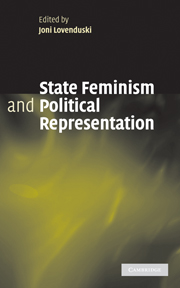Book contents
- Frontmatter
- Contents
- List of figures
- List of tables
- Notes on contributors
- Preface
- List of abbreviations
- 1 Introduction: state feminism and the political representation of women
- 2 Gendering political representation: debates and controversies in Austria
- 3 The Belgian paradox: inclusion and exclusion of gender issues
- 4 A politics for presence: state feminism, women's movements and political representation in Finland
- 5 Gendering the republican system: debates on women's political representation in France
- 6 WPAs and political representation in Germany
- 7 Gendering the debate on political representation in Italy: a difficult challenge
- 8 High tides in a low country: gendering political representation in the Netherlands
- 9 The women's movement, gender equality agencies and central-state debates on political representation in Spain
- 10 Party feminism, state feminism and women's representation in Sweden
- 11 Party government and women's representation debates: the UK
- 12 Women's policy agencies, the women's movement and representation in the USA
- 13 Conclusions: state feminism and political representation
- Appendix 1 Tables of women's representation in eleven countries
- Appendix 2 The RNGS model: summary of variable descriptors
- Index
- References
13 - Conclusions: state feminism and political representation
Published online by Cambridge University Press: 22 September 2009
- Frontmatter
- Contents
- List of figures
- List of tables
- Notes on contributors
- Preface
- List of abbreviations
- 1 Introduction: state feminism and the political representation of women
- 2 Gendering political representation: debates and controversies in Austria
- 3 The Belgian paradox: inclusion and exclusion of gender issues
- 4 A politics for presence: state feminism, women's movements and political representation in Finland
- 5 Gendering the republican system: debates on women's political representation in France
- 6 WPAs and political representation in Germany
- 7 Gendering the debate on political representation in Italy: a difficult challenge
- 8 High tides in a low country: gendering political representation in the Netherlands
- 9 The women's movement, gender equality agencies and central-state debates on political representation in Spain
- 10 Party feminism, state feminism and women's representation in Sweden
- 11 Party government and women's representation debates: the UK
- 12 Women's policy agencies, the women's movement and representation in the USA
- 13 Conclusions: state feminism and political representation
- Appendix 1 Tables of women's representation in eleven countries
- Appendix 2 The RNGS model: summary of variable descriptors
- Index
- References
Summary
Women's movements and state feminism
The main purposes of this study of the politics of political representation decisions are, first, to determine and explain variations in the success of women's movements in opening democratic processes to women's participation and concerns, and, second, to explore whether the state, as a result of effective WPA activities, has intervened to achieve such success. Let us now return to our original questions, the questions that framed this comparative study. Do women's policy agencies matter? And if so, why? Have WPAs made democracies more representative and democratic? Have WPAs advanced the demands of the women's movements in a way that has indeed improved representation in both descriptive and substantive terms?
In this chapter we combine the evidence from the eleven countries to answer our core research questions. We make a comparative analysis of the results of the country studies that have been presented in a more detailed and discursive manner in the individual chapters by applying the model presented in chapter 1. There are costs and benefits to this approach. Inevitably and regrettably our comparative analysis loses much of the wealth of detail and insight provided by the authors of the country chapters. But with comparison we gain the ability to detect trends in the capacity of women's policy agencies to help women's movements and women in general to participate in and influence decisions about policy on political representation.
- Type
- Chapter
- Information
- State Feminism and Political Representation , pp. 260 - 293Publisher: Cambridge University PressPrint publication year: 2005
References
- 6
- Cited by



